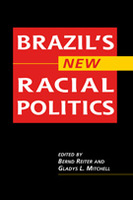Race is an elusive category and provides an even more elusive way to forge a sense of collective belonging. Nobody is more aware of this elusiveness than Brazilian black-power activists. For most of the history of blacks in Brazil, Africans and their descendents had a strong sense of being different from their white slaveholders. This difference was forced onto them and used to hold them at the bottom of Brazil’s social hierarchies, and it left no doubt that Brazilian whites had no intention whatsoever to accept the moral and legal equality of blacks, which held true well into the twentieth century. The sense of black identity was indeed so strong during most of the colonial period and slavery, which lasted until 1888, that African and Brazilian blacks of different ethnic and linguistic backgrounds and of different degrees of biological mixture repeatedly united to contest white supremacy and attempted to overthrow the system that held them at the bottom. On several occasions, Brazil barely escaped its “Haitian moment.” As late as 1931, the radical Frente Negra Brasileira, the Brazilian Black Front, had a membership of about 200,000, mostly concentrated in the industrialized south (Davis 1999: 187). In 1936, however, the authoritarian government of Vargas outlawed the Black Front, together with all other oppositional political parties. The Vargas government sought to discourage any association that had the potential to endanger his project of national unity. The risk of factionalism and even secession was so great during the 1930s that the Vargas government undertook extraordinary measures to forge a sense of nationality, national pride, and even a sense of what it meant to be Brazilian.
Among the most successful in this cause was sociologist Gilberto Freyre (1986). Freyre’s writings on the Brazilian national character provided the ideological foundation upon which a unified nation could be constructed, and the Vargas regime left no means untouched to disseminate this ideology. Brazil would be a racial paradise, inhabited by one race, the Brazilian version of “cosmic race”—a tropical mulatto republic. Anybody daring to say differently was transformed into a naysayer and a reactionary. The concept of a racial paradise promised a solution to finally catch up to the developed world, even if—and especially because—Brazil had such a large mixed population.
To the black-power movement, this move proved devastating. Up until the 1930s, Brazilian blacks were forcefully united by the perverse power of racism and social Darwinism; after the 1930s, asserting one’s blackness was transformed into an act of civic upheaval and antipatriotism and little by little, as the Vargas regime made sure that its version of the truth was accepted, asserting ethnic difference became an act of political incorrectness not only aimed against the state, but against mainstream society. Under Vargas, race was removed from textbooks, censuses, and from the official discourse about Brazil. The state thus produced the main and only official way to represent the country, and any Brazilian—black or white, mixed or indigenous—had no other choice but to accept that reality and to find ways of social mobility that explicitly took it into account. The core of the doctrine disseminated under Vargas was that no matter what their ethnic background, Brazilians are all mixed and hence one. Nevertheless, this was not an “imagined community,” as Benedict Anderson (1991) suggests. Rather, it was a designed community, designed by the state and forced onto its people. The only one imagining, dreaming, and sometimes hallucinating such a community was the father of the idea, Gilberto Freyre.
The Vargas years severely delegitimized any attempt to forge a sense of racial solidarity among excluded blacks. Just as black-power movements regrouped during the 1950s and early 1960s, the state stepped in again, this time to avoid a potentially explosive bonding between labor and racialized groups. During the military regime, black-power activism became subversive and was subject to prosecution in the best-case scenario, but also to state-sponsored persecution, imprisonment, torture, and even death. The military regime also ensured that the category race would disappear again from the census, and it thus sought to curtail even the prospects for an emerging racial solidarity that would embrace and represent all those affected by the forces of racism and racialized exclusion. Categories, after all, are the building blocks of group consciousness (Brubaker 2004). Without numbers, mobilization is greatly complicated, as there can be no sense of a shared destiny if it is not known with whom, and with how many, this destiny is shared. Political activism is all but rendered impossible if there are no data and no existing categories other than being Brazilian.
Bernd Reiter and Gladys L. Mitchell (Gladys Mitchell-Walthour), “The New Politics of Race in Brazil” in Brazil’s New Racial Politics, edited by Bernd Reiter and Gladys L. Mitchell, (Boulder, Colorado: Lynne Rienner Publishers, 2012): 3-5.


